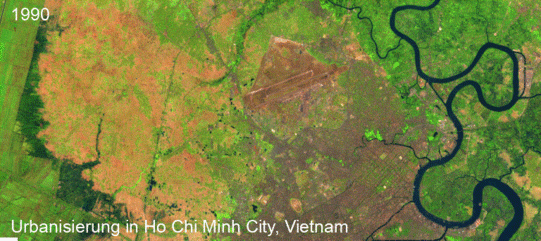Lectures
Module 16: Remote sensing and multi criteria decision analysis (MCDA)
Information about the lecture

Description
Remote sensing provides manifold new data and information products for spatial planning. A strength of remote sensing is its ability to address issues at different spatial and temporal scales, independently of administrative units. Remote sensing systems collect valuable data for research and application, not only over a wide area, but also with the highest level of detail. With the help of aerial and satellite images, both impressive perspectives and surprising insights into cities and landscapes can be gained. Therefore, remote sensing plays an important role in spatial planning.
This course brings answers to the basic questions of remote sensing:
- What is remote sensing?
- How are aerial and satellite images created?
- What are the properties of aerial and satellite images?
Subsequently, basic evaluation methods for satellite and aerial images for obtaining spatial data and monitoring spatial developments will be explained theoretically and demonstrated practically using the remote sensing software ENVI (Exelis). Another focus of the lecture is to show the diverse range of applications of remote sensing in spatial planning from the global to the local level.
Examples of applications include monitoring of megacities, land cover classification, characterisation of urban spaces, recording and evaluation of soil sealing, 3D city model as basic information relevant to planning, remote sensing as a basis for identifying urban structure types, satellite and airborne traffic recording, and estimation of solar energy potential.
Credits
Exam: Module exam (graded)
Type of exam: Oral exam (20-30 minutes)
Exam content: The contents and competences listed in the module handbook are relevant for the exam; the students can make suggestions for focal points in the oral exam.
LSF view
Find out more about all RIM courses


